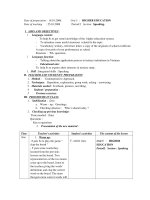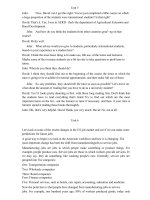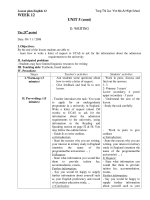tapescript 12 - unit 5 - 8
Bạn đang xem bản rút gọn của tài liệu. Xem và tải ngay bản đầy đủ của tài liệu tại đây (44.33 KB, 3 trang )
Unit 5
John: Now, David. can I get this right: You've just completed a MSc course on which a
large proportion of the students were international students? Is that right?
David: That's it. Yes, I was in AERD - that's the department of Agricultural Extension and
Rural Development.
John: And how do you think the students from other countries gota!~ng on that course?
David: Pretty well.
John: What advice would you give to students, particularly international students, based
on your experience as a student here?
David: I think the most basic thing is to make use, full use, of the tutors and lecturers.
Maybe some of the overseas students are a bit too shy to take questions or prob1ems to
tutors.
John: What do you think they should do?
David: I think they should find out at the beginning of the course the times at which the tutor
is going to be available for tutorial appointments. and then make full use of them.
John: So. any problems. they should tell the tutor as soon as possible? Let's move on.
what about the amount of reading that you have to do as a university student?
David: Yes! It looks pretty daunting at first. with those long reading lists. Don't think that the
students have to read everything that's listed Try to find out which are the most important
items on the list - ask the lecturer or tutor if necessary. and then. if your time is limited. spend
it reading those books thoroughly.
John: OK, that's very helpful. David Thank you very much. David: No, not at all.
Unit 6
Let's look at some of the recent changes in the US job market and see if we can make some
predictions for future jobs.
A good way to begin is to look at the American workforce and how it is changing. The most
important change has been the shift from manufacturingjobs to service jobs.
Manufacturing jobs are jobs in which people make something or produce things. For
example, people produce cars. Service jobs are those in which workers provide services, 01
we may say. they do something, like washing people's cars. Generally, service jobs are
grouped into five categories:
One: Transportation companies
,
Two: Wholesale companies
Three: Retail companies
Four: Finance companies
Five: Personal services, such as hotels, cars repair, accounting, education and medicine Now
the point here is that people have changed from manufacturing jobs to service
jobs. For example, one hundred years ago, 80% of workers produced goods, today only 30%
do. Economists predict that by the year 2020, nine out of every ten workers will work in
service jobs.
Unit 7
The inhabitants of Tango, a small island in the Atlantic Ocean, discovered a plant which
contained a powerful drug. They grew the plant all over the island and they took the drug
every day. This made it more difficult for them to think rationally - it stopped them worrying
about the future and enabled them to forget all their problems. At the same time, it made it
much easier for them to relax and enjoy themselves. And because of the drug. the whole
population of the island stopped working and spent all their time singing and dancing and
looking at the sea.
Unfortunately this had very bad effects on the country's economy. The workers and farmers
became lazy, the children didn't want to go to school and the whole population ' began to run
short of food This, however, didn't discourage people from taking the drug. The Prime
Minister made speeches on the 1V warning them about the drug. but nobody took any notice,
and before long the economy of the country was in ruins. This forced the Government to take
measures. They introduced a law to make the drug illegal. But that only made the situation
worse. The law couldn't prevent the people from taking the drug. On the contrary, the fact
that the drug was illegal encouraged people to take it more. They put the drug-takers into
prison. But this did not have any effect, there were not enough prisons for them. Eventually,
the Government found a solution: they exported the drug to other
. countries. This saved the islanders from having to work more than one day a week, and
allowed them to spend the rest of their time sitting in the sun without any care in the world.
Unit 8
Dr. Davis, a Dutch biologist is being interviewed about people's life expectancy in the future.
st
Many scientists predict that in the 21 century people will be living
into the incredible age of 130. What do you think about this?
Well. I quite agree with them. They have reasons to be confident about that.
Interviewer: What are the reasons?
Dr. Davis: In fact their preroction is based on research and on the fact that the
centenarian population is mushrooming as our general health improves.
Interviewer: Can you explain this further?
Dr. Davis: A century ago average life expectancy in Europe was 45. Today,
providing we look after ourselves, eat more healthily, cut down on things like butter, alcohol
and cigarettes, we can add nearly 35 years to that figure.
Interviewer: So these are the factors that help people live longer?
Dr. Davis: Yes. But the most important factor is the development in medical science.
Interviewer: What do you mean?
Dr. Davis: Nobody roes from old age, just from diseases that affect people when
they get older.
Interviewer: So scientists are trying to find cures for fatal diseases like cancer and
Aids?
Dr. Davis: Right. Nowadays, about 50% of cancers are curable, and I really believe
that within 30 years this will increase to 80%. And in ten years' time Aids will also be
brought under control. too.
Interviewer: That sounds interesting. What about living forever?
Dr. Davis: So far. eternal life is just science fiction. But with the advance of science,
it's not impossible.









